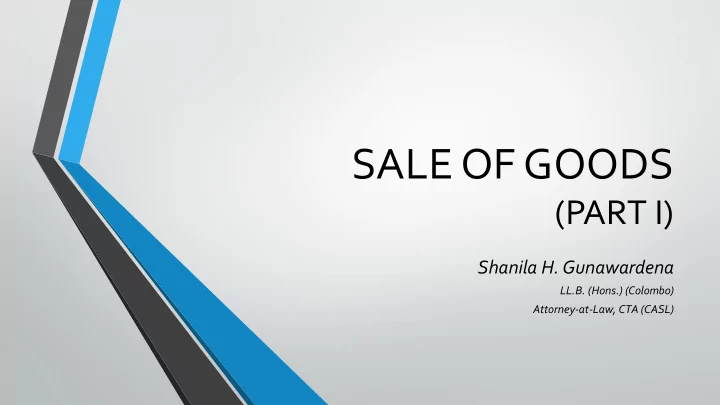

SALE OF GOODS (PART I) Shanila H. Gunawardena LL.B. (Hons.) (Colombo) Attorney-at-Law, CTA (CASL)
INTRODUCTION • In ancient times, “barter” (exchange of one item for another) was common • Sale of goods is the most common way in which ownership of goods passes from one person [Seller] to another [Buyer] • Applicable law: Sale of Goods Ordinance No. 11 of 1896 (as amended) Identical to the English Law
A CONTRACT FOR SALE OF GOODS • Section 2(1) – A contract of sale of goods is a contract whereby the seller transfers or agrees to transfer the property in goods to the buyer for a money consideration, called " the price".There may be a contract of sale between one part-owner and another. • Section 2(3) Sale – when the property in the goods are transferred. Agreement to sell – when the transfer of property takes place at a future time or subject to some condition. • Section 2(4) – When does an agreement to sell become a sale? When time lapses or the conditions are fulfilled. • Most important elements in a sale of goods contract: 1. The goods 2. The money consideration 3. Capacity to contract
WHAT ARE “GOODS”? Section 59 – “ goods" include all movables except moneys. The term includes growing crops and things attached to or forming part of the land which are agreed to be severed before sale or under the contract of sale. • Anything attached / forming part of a land or building? • Music • Lecture or talk • Computer Software Australian Case - Toby Constructions Products Pty Ltd vs. Computer Bar (Sales) Pty Ltd (1983) 2 NSWLR 48 • Gas and Electricity • Commemorative coins and currency notes (collectors’ items)
CONSIDERATION • Consideration for the sale of goods must be MONEY . • Otherwise, the contract is one of barter or exchange. • However, consideration could be partly in money and partly in goods or some other articles of value. E.g. motor cars being sold in consideration of the buyer “trading in” his used car as well as paying some money for the new car.
CAPACITY TO BUY AND SELL • Section 3 “Capacity to buy and sell is regulated by the general law concerning capacity to contract, and to transfer and acquire property: Provided that where necessaries are sold and delivered to a minor, or to a person who by reason of mental incapacity or drunkenness is incompetent to contract, he must pay a reasonable price therefor. ‘Necessaries’ in this section means goods suitable to the condition in life of such minor or other person, and to his actual requirements at the time of the sale and delivery .”
WHAT IS NOT A CONTRACT FOR SALE OF GOODS? (1) Contract for work and material • Goods vs. Skills • A contract for the sale of goods – contemplates the delivery of a movable item. • If the substance of the contract is for the exercise of some skill and the delivery of the movable is only a subsidiary part of the contract – no sale of goods. • English case - Robinson vs. Graves (1935) – painting a portrait plus supplying the canvass and other material was held to be a contract for work and materials and not a contract for sale of goods. (2) Contract of hire purchase/ lease • Hirer does not “agree to buy” • Owner agrees to sell only if the hirer performs all necessary conditions. E.g. payment of installments due.
FORMALITIES REQUIRED FOR A CONTRACT OF SALE OF GOODS Section 4 – a contract for the sale of goods can be made: • in writing; or • by word of mouth (verbally); or • partly in writing and partly by word of mouth (verbally); or • implied by the conduct of the parties.
SUBJECT MATTER OF THE CONTRACT • “Existing Goods ” vs. “Future Goods ” Section 6(1) – The goods which form the subject of a contract of sale may be either existing goods , owned or possessed by the seller, or goods to be manufactured or acquired by the seller after the making of the contract of sale ( future goods – defined in Section 59). • Section 7 – Where there is a contract for the sale of specific goods (specific goods defined in Section 59 – goods identified and agreed upon at the time a contract of sale is made), and the goods without the knowledge of the seller have perished at the time when the contract is made, the contract is void. • Section 8 – Where there is an agreement to sell specific goods , and subsequently the goods without any fault on the part of the seller or buyer perish before the risk passes to the buyer, the agreement is thereby avoided.
Recommend
More recommend